
下载亿题库APP
联系电话:400-660-1360

下载亿题库APP
联系电话:400-660-1360

请谨慎保管和记忆你的密码,以免泄露和丢失

请谨慎保管和记忆你的密码,以免泄露和丢失

为了帮助广大考生顺利通过口译笔译考试,帮考网为大家分享了一些口译笔译相关内容,希望大家每天坚持练习,积极备考。
同心协力 共创未来
——在二十国集团领导人第四次峰会上的讲话
中华人民共和国主席
尊敬的哈珀总理,
各位同事:
很高兴来到多伦多参加二十国集团领导人第四次峰会,同各位同事共同讨论推动世界经济全面复苏这个重大议题。首先,我谨对哈珀总理和加拿大政府为本次峰会所作的积极努力和周到安排,表示衷心的感谢!我还要感谢大家对上海世博会给予的宝贵支持和帮助。
在二十国集团成员和国际社会共同努力下,世界经济正在逐步复苏,但复苏基础不牢固、进程不平衡,存在较大不确定性。部分国家主权债务风险持续上升,一些系统重要性金融机构的问题集中暴露,主要货币汇率大幅波动,国际金融市场动荡不定,大宗商品价格高位震荡,各种形式的保护主义明显增多。这表明,国际金融危机深层次影响尚未消除,世界经济系统性和结构性风险仍十分突出。我们要深刻认识国际金融危机深层次影响的严重性和复杂性,继续发扬同舟共济、合作共赢的精神。
匹兹堡峰会提出的“强劲、可持续、平衡增长框架”对世界经济长远健康发展具有重要意义。为了推动世界经济尽早进入强劲、可持续、平衡增长,我愿提出以下建议。
第一,推动二十国集团从应对国际金融危机的有效机制转向促进国际经济合作的主要平台。当前,世界经济形势仍然十分复杂,需要二十国集团发挥引领作用。我们应该着眼长远,推动二十国集团从协同刺激转向协调增长、从短期应急转向长效治理、从被动应对转向主动谋划。要加强二十国集团成员宏观经济政策协调,保持合理政策力度,支持发生主权债务危机的国家克服当前面临的困难。要审慎稳妥把握经济刺激政策退出的时机、节奏、力度,巩固世界经济复苏势头。要全面落实前3次峰会作出的决定和达成的共识,共同维护二十国集团信誉和效力,本着循序渐进、互利共赢的原则推进二十国集团机制化建设,妥善处理各种矛盾和分歧,确保二十国集团峰会机制在健康轨道上向前发展。要处理好二十国集团机制同其他国际组织和多边机制的关系,确保二十国集团在促进国际经济合作和全球经济治理中发挥核心作用。
第二,加快建立公平、公正、包容、有序的国际金融新秩序。我们应该牢记国际金融危机的深刻教训,正本清源,对症下药,本着简单易行、便于问责的原则推进国际金融监管改革,建立有利于实体经济发展的国际金融体系。要建立并执行严格的资本和杠杆率要求,将影子银行体系纳入监管,制订全球统一的会计准则。要着力加强对系统重要性金融机构的监管,采取必要的预防性措施,防止风险投机过度。要强调国际监管核心原则和标准的一致性,同时要充分考虑不同国家金融市场的差异性,提高金融监管的针对性和有效性。要加强对信用评级机构的监管,减少对信用评级机构的依赖,完善信用评级机构行为准则和问责制度,特别是要制定客观、公正、合理、统一的主权信用评级方法和标准,使有关评级结果准确反映一国经济状况和信用级别。要继续推进国际金融机构改革,加快完成国际货币基金组织份额调整,推动更多新兴市场国家和发展中国家人员出任国际金融机构高管,提高发展中国家代表性和发言权。要加强国际货币基金组织能力建设和监督改革,加强对各方特别是主要储备货币发行经济体宏观经济政策的监督。
第三,促进建设开放自由的全球贸易体制。我们必须以实际行动反对各种形式的保护主义,坚决倡导和支持自由贸易,继续承诺并严格执行不对商品、投资、服务设置新的限制措施。发达国家要以更加开放的态度促进国际贸易发展,本着互利共赢、共同发展的原则,坚持以对话协商妥善处理贸易摩擦。要按照维护多哈授权、锁定已有成果、以现有谈判案文为基础的原则,推动多哈回合谈判取得全面、均衡的成果,尽早实现发展回合目标。
各位同事!
我们要牢牢把握强劲、可持续、平衡增长三者的有机统一。确保强劲增长是当前世界经济发展的首要任务,可持续增长是长期目标,通过转变经济发展方式实现平衡增长是客观要求。我们应该积极推动强劲增长,着力发展实体经济,促进民众就业,加强新兴产业领域国际合作,在前进中克服困难,在增长中解决问题。我们应该注重保持可持续增长,不仅要保持环境可持续性,也要保持财政、货币、贸易、产业等政策的可持续性,减少宏观经济波动和风险。我们应该努力实现平衡增长,既要实现各国国内不同区域、不同产业平衡增长,也要实现不同国家和地区平衡增长。实现世界经济强劲、可持续、平衡增长是一个长期复杂的过程,不可能一蹴而就,既要持之以恒、坚定推进,也要照顾到不同国家国情,尊重各国发展道路和发展模式的多样性。
中国在推动经济发展过程中始终努力推进经济强劲增长,从1978年到2008年中国经济年均增长9.8%。国际金融危机发生以来,中国全面实施并不断丰富完善应对国际金融危机冲击的一揽子计划和政策措施,2009年中国经济增长8.7%,为地区和世界经济复苏作出了自己的贡献。2010年,中国经济继续保持平稳较快发展势头,一季度经济增长11.9%。中国始终重视增长的可持续性,把财政赤字控制在占国内生产总值3%的范围之内。今年以来,我们在保持宏观经济政策连续性和稳定性的同时,强调要根据新形势新情况提高政策的针对性和灵活性,妥善处理好保持经济平稳较快发展、调整经济结构、管理通胀预期的关系,着力增强经济增长的可持续性。中国始终高度重视平衡增长。在应对国际金融危机冲击的过程中,中国各项扩大内需政策取得明显成效,2009年在货物出口总额减少16%的情况下,社会消费品零售总额实际增长近17%,全社会固定资产投资增长约30%,经常项目顺差占国内生产总值的比重降至6.1%。今年以来,中国贸易顺差继续大幅减少,经常项目收支加快趋向平衡,经济协调发展良好势头进一步增强。
我们清醒地认识到,中国人口多、底子薄,城乡、区域发展不平衡,环境和资源约束矛盾突出,尤其是中国每年城镇需要安排就业的劳动力2400万人,大量农村富余劳动力需要转移就业,同时还有相当数量的贫困人口未脱贫。为了解决这些困难和问题,我们坚持以人为本、全面协调可持续发展的科学发展观,把加快转变经济发展方式作为贯彻落实科学发展观的重要目标和战略举措,重点加快调整国民收入分配结构、城乡结构、区域结构、产业结构,加快推进科技创新,加快建设现代农业、生态文明、文化产业、社会保障体系,努力推动经济社会协调发展。这些调整和转变不仅有利于中国经济全面协调可持续发展,也将对世界经济发展产生积极影响。转变经济发展方式是一个长期复杂的过程,需要付出艰苦努力。中方愿同各方相互借鉴、取长补短、平等合作、共同发展,推动世界经济形成更加合理的产业分工结构、更加均衡的金融贸易结构、更加科学的资源配置结构、更加公平的利益共享结构,实现世界经济持续协调发展。
各位同事!
要真正实现世界经济长期持续增长,必须帮助广大发展中国家实现充分发展,缩小南北发展差距。在国际金融危机中,发展中国家受到的冲击十分严重,克服国际金融危机影响面临的困难也十分严重。二十国集团成员主要是发达国家、新兴市场国家、工业化程度较高的发展中国家,成员国国内生产总值占世界的85%,但我们不能忽视超过世界国家总数85%的其他发展中国家的发展诉求。二十国集团有责任为解决发展问题提供更强政治动力、更多经济资源、更好制度保障。
国际金融危机使联合国千年发展目标进程面临新的困难,2015年前完成预期目标任重道远。我们应该在发展问题上采取更多实际行动,保障发展资源,完善发展机制,促进发展合作,确保如期实现联合国千年发展目标。发达国家应该切实兑现官方发展援助承诺、开放市场、减免债务,加大对发展中国家的资金和技术支持,提高发展中国家自我发展能力。世界银行、国际货币基金组织等国际金融机构的资源应该优先用于帮助发展中国家尤其是最不发达国家。
国际金融危机发生以来,中国通过各种方式和渠道向发展中国家提供援助。我们向国际货币基金组织增资500亿美元,明确要求将资金优先用于最不发达国家。我们同有关国家和地区签署了总额达6500亿元人民币的双边货币互换协议,共同应对国际金融危机冲击。我们设立100亿美元的中国-东盟投资合作基金,向东盟国家提供150亿美元信贷支持,积极参与推动以清迈倡议多边化和亚洲债券市场发展倡议为主要内容的东亚财金合作,维护地区经济金融形势稳定。我们向上海合作组织其他成员国提供100亿美元的信贷支持。我们向非洲国家提供100亿美元优惠贷款,免除非洲重债穷国和最不发达国家债务,逐步给予非洲同中国建交的最不发达国家95%的产品免关税待遇。我愿代表中国政府庄严承诺,中国将在南南合作框架内继续向发展中国家提供力所能及的援助,尽力帮助发展中国家实现发展。
各位同事!
二十国集团和世界的未来需要大家共同开创。让我们同心同德,携手并肩,规划和建设世界经济更加美好的明天!
谢谢各位。
Work in Unity for the Future
Remarks by H. E. Hu Jintao
President of the People\'s Republic of China
At the Fourth G20 Summit
Prime Minister Stephen Harper,
Dear Colleagues,
It gives me great pleasure to attend the fourth G20 Summit in Toronto and discuss with you the important subject of promoting full recovery of the world economy. Let me begin by thanking Prime Minister Harper and the Canadian government for their active efforts and thoughtful arrangements for this meeting. I also wish to take this opportunity to express thanks to all of you for giving valuable support and assistance to Expo 2010 Shanghai.
With the concerted efforts of G20 members and the entire international community, the world economy is gradually recovering. But the recovery is neither firmly established nor balanced and there are still quite many uncertainties down the road. Sovereign debt risks continue to rise in some countries. A host of problems have been exposed in some systemically-important financial institutions. Exchange rates of major currencies fluctuate drastically and international financial markets suffer from persistent volatility. Commodity prices hover at a high level and protectionism of various forms is notably growing. All this shows that the deeper impact of the international financial crisis is yet to be overcome and systemic and structural risks in the world economy remain very serious. We must fully recognize the gravity and complexity of the deep impact of the international financial crisis and continue to work in a spirit of unity and win-win progress.
The Framework for Strong, Sustainable and Balanced Growth launched at the Pittsburgh Summit is of great importance to the long-term healthy growth of the world economy. I wish to offer the following proposals concerning the efforts required for bringing about strong, sustainable and balanced world economic growth at an early date.
First, we need to turn the G20 from an effective mechanism to counter the international financial crisis to a premier platform for advancing international economic cooperation. The complex world economic situation makes it necessary for the G20 to play a guiding role. We need to take a longer-term perspective and shift the focus of the G20 from coordinating stimulus measures to coordinating growth, from addressing short-term contingencies to promoting long-term governance and from passive response to proactive planning. We should strengthen coordination of macroeconomic policies among G20 members, keep the right intensity of our policies and support countries hit by the sovereign debt crisis in overcoming the current difficulties. We must act in a cautious and appropriate way concerning the timing, pace and intensity of an exit from the economic stimulus packages and consolidate the momentum of recovery of the world economy. We must follow through on the decisions and consensus of the previous G20 summits and uphold together the credibility and effectiveness of the G20. We must advance the G20\'s institutional-building under the principle of seeking gradual progress and win-win outcomes, and properly handle various problems and differences in order to ensure the sound development of the G20 summit mechanism. We need to well manage the G20\'s relationship with other international organizations and multilateral mechanisms and ensure that the G20 plays a core role in promoting international economic cooperation and global economic governance.
Second, we need to accelerate the establishment of a new international financial order that is fair, equitable, inclusive and well-managed. We must learn the hard lessons of the international financial crisis, take effective measures to address the root causes of the crisis, and push forward reform to ensure that the future international financial supervisory and regulatory regime is easy to operate and highly accountable. It is important to establish an international financial system that is good for the growth of the real economy. We need to establish and enforce strict capital and leverage ratio requirements, bring the shadow banking system under supervision and regulation and formulate globally consistent accounting rules. We need to make greater efforts to strengthen supervision and regulation of systemically-important financial institutions and take necessary precautionary measures to forestall excessive risks and speculation. We need to stress the consistency of core principles and standards of international supervision and regulation and, at the same time, take into full consideration the differences between financial markets of individual countries to make financial supervision and regulation more focused and effective. We need to strengthen regulation of credit rating agencies, reduce dependence on these agencies and improve their code of conduct and accountability system. It is particularly important to establish objective, fair, reasonable and uniform methodologies and standards for sovereign credit rating so that the rating results can accurately reflect the state of a country\'s economy and credit worthiness. We need to continue to push forward the reform of international financial institutions, complete the adjustment of IMF quotas at a faster pace, enable more people from emerging markets and developing countries to assume senior management posts at international financial institutions, and increase the representation and voice of developing countries. We need to enhance the IMF\'s capacity-building and surveillance reform, and we need to strengthen supervision over macroeconomic policies of various parties, particularly major reserve currency issuing economies.
Third, we need to advance the building of an open and free global trading regime. We must take concrete actions to reject all forms of protectionism, and unequivocally advocate and support free trade. We must renew our commitment not to impose new restrictions on goods, investment and services, and earnestly follow through on this commitment. Developed countries should promote international trade with greater openness. It is important to address trade frictions appropriately through dialogue and consultation and under the principle of mutual benefit and common development. We should work for comprehensive and balanced outcomes from the Doha round negotiations and attain the goals of this development round at an early date. And we should do so by upholding the Doha mandate, locking up the existing achievements, and working on the basis of the existing negotiating text.
Dear Colleagues,
We must recognize that "strong, sustainable and balanced growth" is an integral concept. To ensure strong growth is the top priority in today\'s world economic development; to enable sustainable growth is our long-term objective; and to achieve balanced growth through the transformation of the economic development pattern is necessitated by the calling of our times. We need to take proactive steps to ensure strong growth, make great efforts to develop the real economy, create jobs for the people and step up international cooperation in emerging industries. We should overcome difficulties in the course of progress and tackle challenges through growth. We should value sustainable growth, which includes sustainability of the environment as well as sustainability of fiscal, monetary, trade and industrial policies, and reduce macroeconomic fluctuations and risks. We should strive for balanced growth, including balanced growth both among different parts and industries of a country and among different countries and regions. It will take a long and complex process to achieve strong, sustainable and balanced growth of the world economy. It cannot be done overnight. We must make persistent efforts to push forward this process. And in doing so, we must also take into account specific circumstances of individual countries and respect their diverse development paths and models.
In its pursuit of economic development, China has all along worked hard to promote strong economic growth. Between 1978 and 2008, the Chinese economy grew at an average annual rate of 9.8%. Since the outbreak of the international financial crisis, China has comprehensively implemented and continuously enriched and improved its package plan and other policy measures in response. As a result, the Chinese economy grew by 8.7% in 2009 and contributed its part to regional and global economic recovery. Since the start of 2010, the Chinese economy has maintained steady and relatively fast growth. In the first quarter, the economy grew by 11.9%. China has always valued sustainable growth, as evidenced by its efforts to keep budget deficit under 3% of GDP. Since the beginning of this year, as we work to maintain the consistency and stability of our macroeconomic policies, we have also stressed the need to make our policies more responsive and flexible in the light of evolving circumstances, strike the right balance between ensuring steady and relatively fast economic growth, restructuring the economy and managing inflation expectations, and put in greater efforts to make economic growth more sustainable. China has always attached great importance to balanced growth. In countering the international financial crisis, the various policies China has adopted to boost domestic demand have shown notable results. In 2009, while China\'s total exports in goods dropped by 16%, its retail sales were up by nearly 17% in real terms, fixed asset investment increased by about 30%, and current account surplus relative to GDP fell to 6.1%. Since the start of this year, China\'s trade surplus has continued to drop by a big margin. The trend towards current account balance has picked up speed. And balanced economic development has gathered even stronger momentum.
We are soberly aware of the difficulties and challenges that China faces, including a large population, a weak economic foundation, lack of balance in the development between urban and rural areas and among different regions, and serious environmental and resource constraints. Each year, 24 million urban residents enter the job market and a huge number of surplus rural workers need to find non-agricultural jobs. And a considerable number of people are yet to be lifted out of poverty. To address these difficulties and challenges, we have been following a scientific outlook on development that puts people first and seeks comprehensive, balanced and sustainable development. A key objective and strategic move in our endeavor to implement this scientific outlook is to accelerate the transformation of economic development pattern. We are focusing our efforts on readjusting at a faster pace national income distribution pattern, urban-rural development structure, regional development structure and industrial structure. We are speeding up efforts to encourage scientific and technological innovation, and expediting the development of modern agriculture, conservation culture, cultural industries and the social security system. Our goal is to promote balanced economic and social progress. These adjustments and transformations will not only contribute to the comprehensive, balanced and sustainable growth of the Chinese economy, but also benefit the world economy. To transform the pattern of economic growth is a long-term and complex process that requires tremendous efforts. China stands ready to work with other parties to draw on each others\' strength, pursue cooperation on the basis of equality and common development, and bring about a more rational division of international labor, a more balanced financial and trade structure, a more scientific pattern for resource allocation and a more equitable system for interest sharing so as to put the world economy on the track of sustained and balanced growth.
Dear Colleagues,
To achieve genuine long-term and sustainable growth of the world economy, it is imperative to help developing countries achieve full development and narrow the development gap between the North and the South. Developing countries have been hit hard by the financial crisis and they find it a daunting task to overcome the difficulties caused by the crisis. The G20 is primarily composed of developed countries, emerging markets and developing nations with a relatively higher level of industrialization. The combined GDP of G20 members accounts for 85% of the world\'s total. However, we should not neglect the development aspirations of other developing countries, which take up over 85% of countries in the world. It is incumbent upon the G20 to provide stronger political drive, greater economic resources and better institutional guarantee for development.
The international financial crisis has made it more difficult to attain the UN Millennium Development Goals (MDGs). It will be an uphill battle to achieve the set objectives by 2015. We must take more credible actions to address the issue of development. We must secure development resources, improve development institutions and promote development cooperation to ensure that the UN MDGs will be met on schedule. Developed countries should honor in good faith their commitments on official development assistance, market opening, and debt reduction and cancellation. They should scale up financial and technological support for developing countries and help them build stronger capacity for self development. The World Bank, the IMF and other international financial institutions should use their resources to help, on a priority basis, developing countries, the least developed countries in particular.
Since the outbreak of the international financial crisis, China has provided assistance to developing countries through multiple means and channels. We contributed US$50 billion to IMF\'s resource increase with an explicit request that the resources be used, first and foremost, to help the least developed countries. We signed bilateral currency swap agreements worth RMB650 billion yuan with relevant countries and regions in a joint response to the financial crisis. To maintain regional economic and financial stability, we have established a US$10 billion China-ASEAN Investment Fund, provided US$15 billion of credit support to ASEAN countries, and actively engaged in and pushed forward East Asian financial cooperation focusing mainly on Chiang Mai Initiative Multilateralization and the Asian Bond Market initiative. We have provided US$10 billion of credit support to other member states of the Shanghai Cooperation Organization. We made the decision to provide US$10 billion in concessional loans to African countries and cancel the debts owed by heavily indebted poor countries and least developed countries in Africa and we will phase in zero-tariff treatment to 95% of the products from the least developed African countries having diplomatic ties with China. On behalf of the Chinese government, I would like to make the solemn commitment that China will continue to offer assistance to other developing countries as its ability permits within the framework of South-South cooperation, and do its utmost to help other developing countries achieve development.
Dear Colleagues,
It is up to all of us to work together to shape the future of the G20 and the world as a whole. Let us unite as one and work side by side to plan for and build an even better future for the world economy.
Thank you.
看到这里小伙伴们是否有所收获呢?希望帮考网为大家分享的内容能给大家带来帮助,后续也可以多关注帮考网,这里有更多的考试资讯,你想知道的都在这!
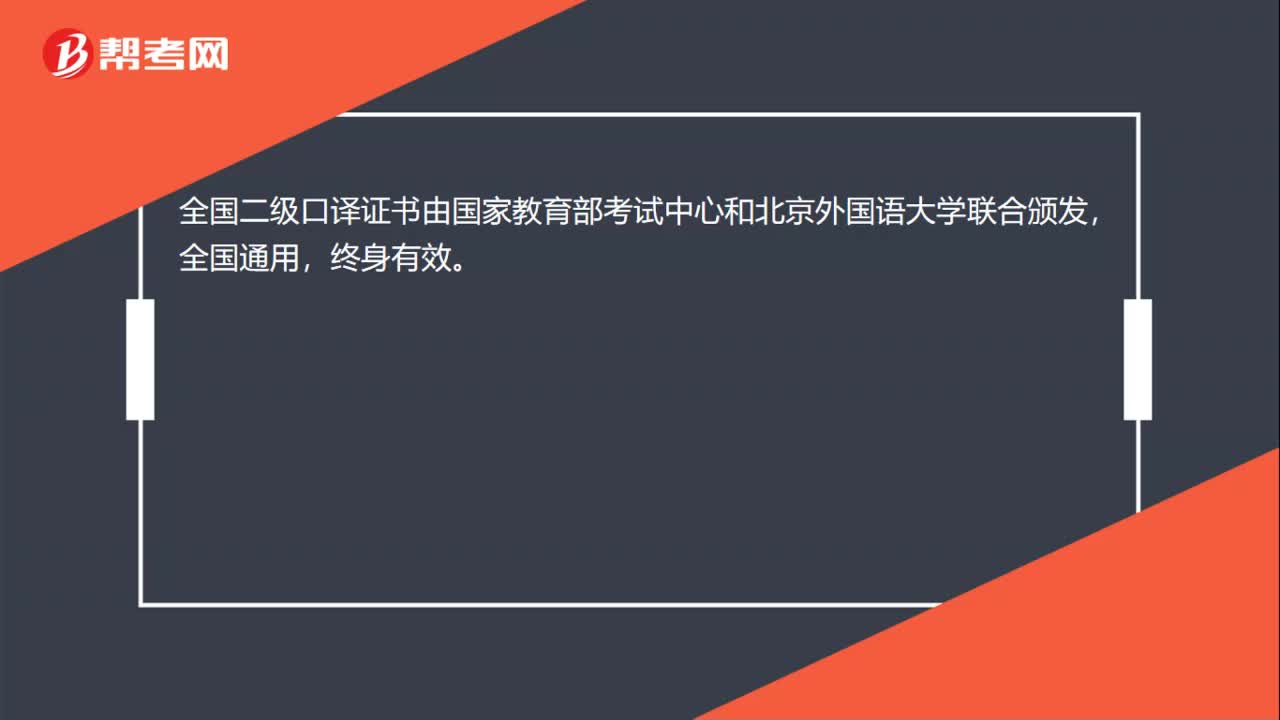 17
17全国二级口译证书是由哪个部门颁发?:全国二级口译证书是由哪个部门颁发?全国二级口译证书由国家教育部考试中心和北京外国语大学联合颁发,全国通用,终身有效。
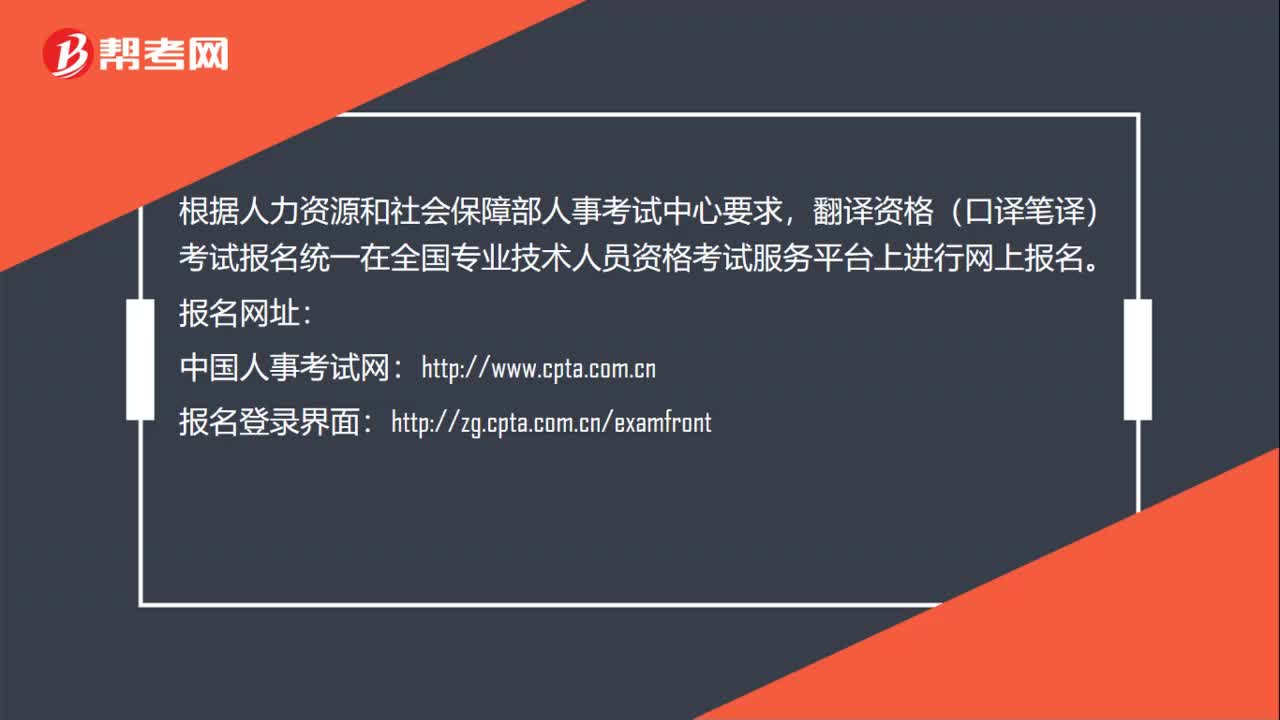 33
33口译笔译考试只能在网上报名吗?:口译笔译考试只能在网上报名吗?根据人力资源和社会保障部人事考试中心要求,翻译资格(口译笔译)考试报名统一在全国专业技术人员资格考试服务平台上进行网上报名。报名网址:中国人事考试网:http:www.cpta.com.cn:报名登录界面:httpzg.cpta.com.cnexamfront
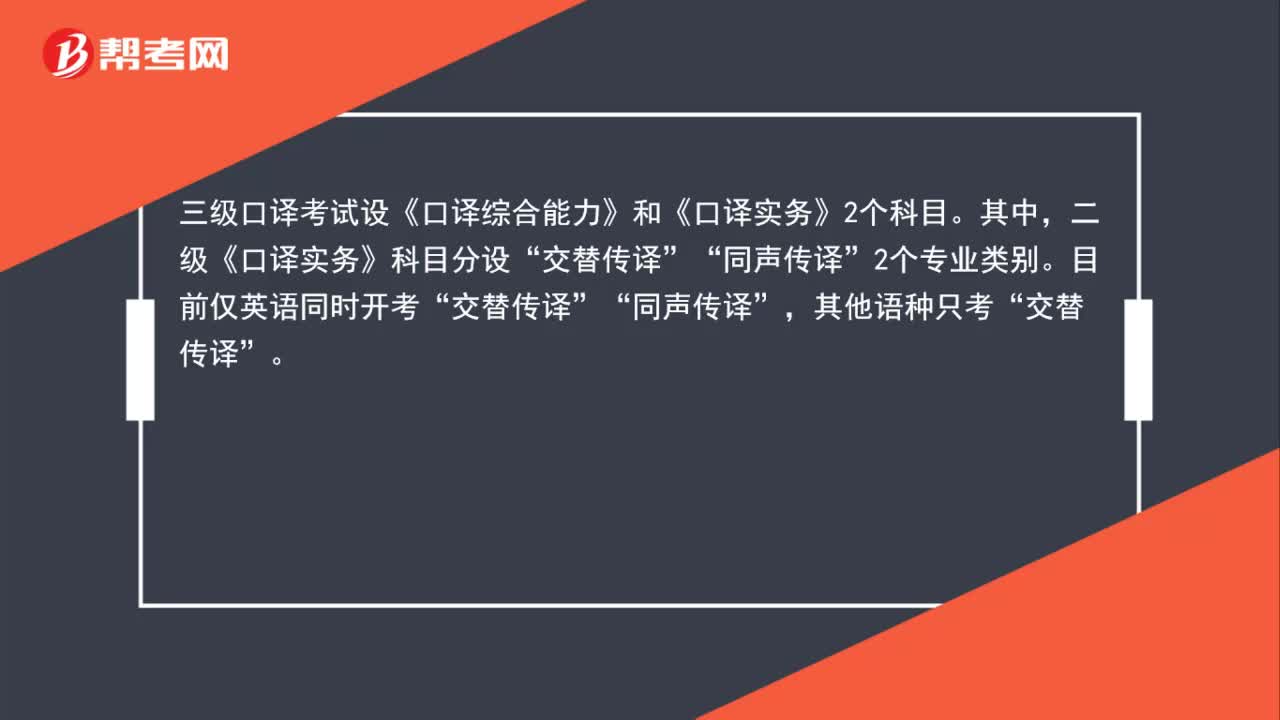 42
42二三级口译考试有哪些考试科目?:二三级口译考试有哪些考试科目?三级口译考试设《口译综合能力》和《口译实务》2个科目。其中,二级《口译实务》科目分设“交替传译”2个专业类别”目前仅英语同时开考。同声传译”其他语种只考“交替传译”
 00:23
00:232020-06-03
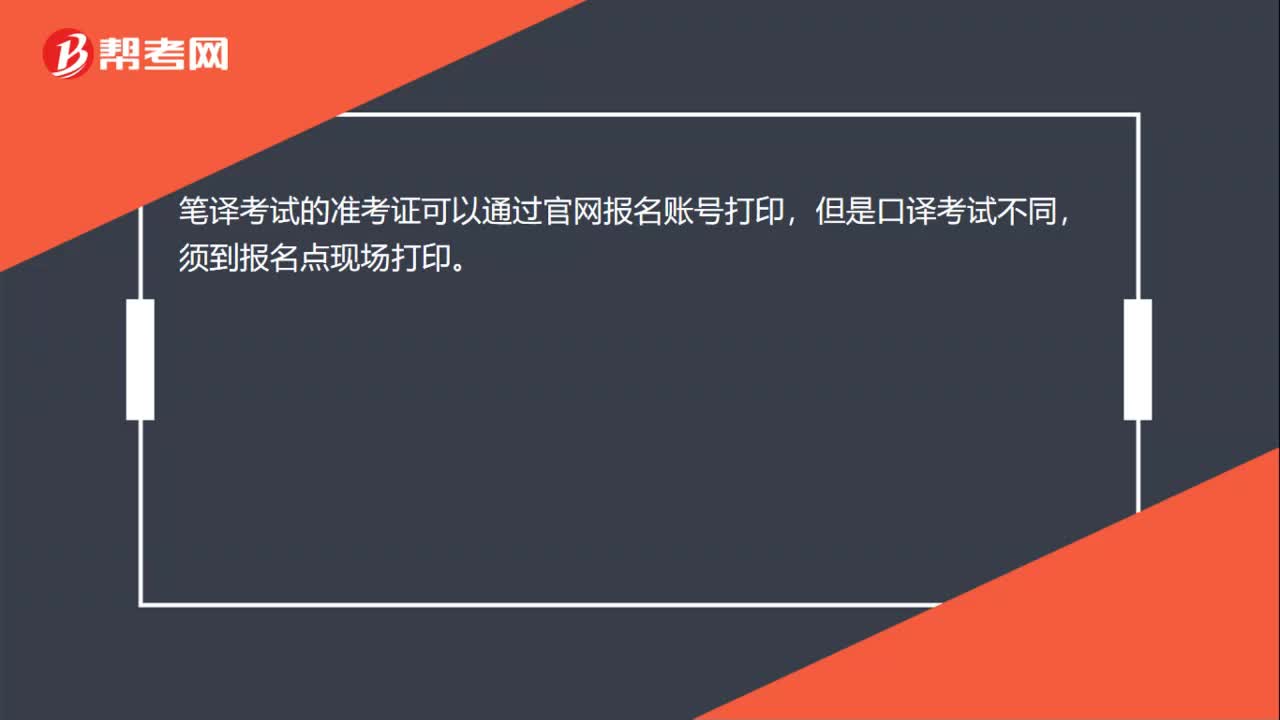 00:15
00:152020-06-03
 00:27
00:272020-06-03
 00:17
00:172020-06-03
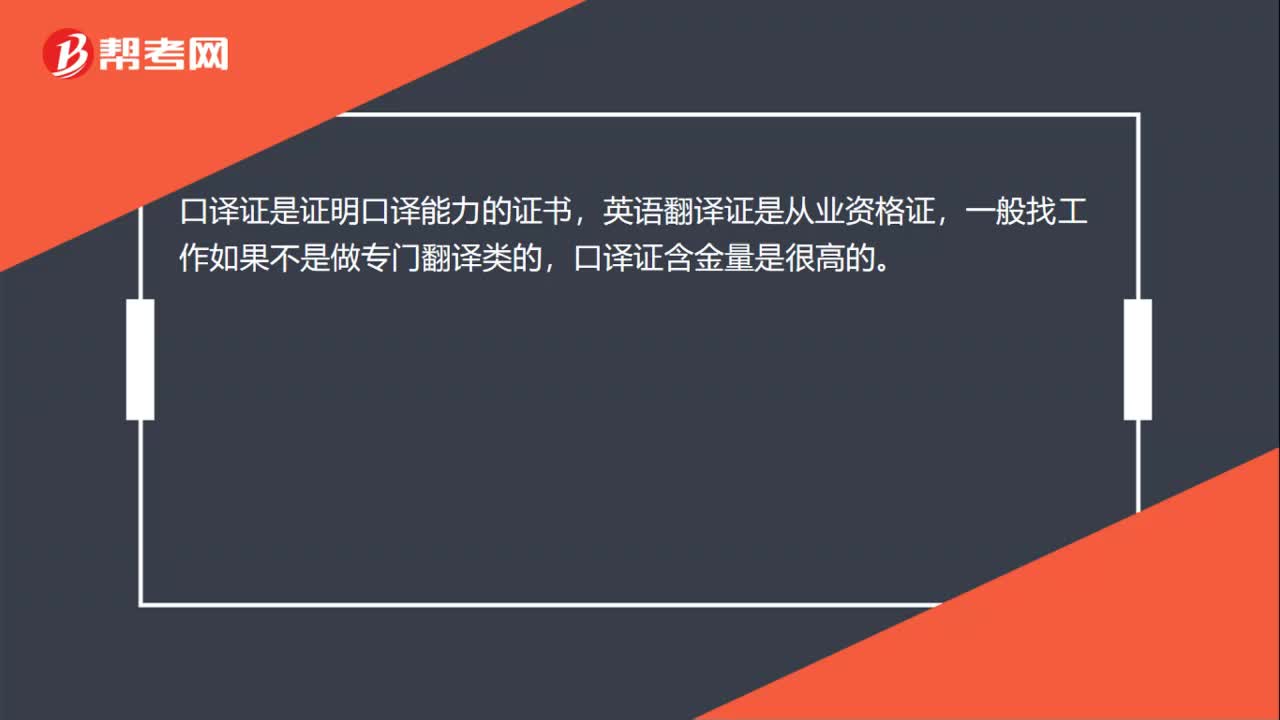 00:17
00:172020-06-03

微信扫码关注公众号
获取更多考试热门资料